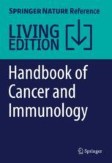Search
Search Results
-
Immunotherapy for Pancreatic Cancer
Pancreatic cancer is currently the fourth leading cause of cancer-related deaths with a high fatality rate, and is predicted to become the second...
-
Metabolite-Based Biosignature of Pancreatic Cancer
Pancreatic ductal adenocarcinoma (PDAC) is the most common pancreatic neoplasm and one of the leading causes of cancer-associated deaths. Lack of...
-
Cancer-Derived Immunoglobulin G and Pancreatic Cancer
Immunoglobulin (Ig) is traditionally believed to be produced solely by B cells. Nonetheless, mounting evidence has demonstrated that various types of...
-
ITGB6 promotes pancreatic fibrosis and aggravates the malignant process of pancreatic cancer via JAK2/STAT3 signaling pathway
Integrin β6 (ITGB6) is upregulated in multiple tumor types and elevated ITGB6 levels have been detected in patients with chronic pancreatitis....

-
The Spanish Familial Pancreatic Cancer Registry (PANGENFAM): a decade follow-up of individuals at high-risk for pancreatic cancer
The Spanish Familial Pancreatic Cancer Registry (PANGENFAM) was established in 2009 and aims to characterize the genotype and phenotype of familial...

-
Fibronectin fragments generated by pancreatic trypsin act as endogenous inhibitors of pancreatic tumor growth
BackgroundThe pancreatic microenvironment has a defensive role against cancer but it can acquire tumor-promoting properties triggered by multiple...

-
Can our experience with surveillance for inherited pancreatic cancer help to identify early pancreatic cancer in the general population?
Screening of the general population for cancer is a matter of primary prevention reducing the burden of disease. Whilst this is successful for...

-
A Humanized Patient-Derived Xenograft Model for Pancreatic Cancer
Pancreatic cancer is associated with a high mortality rate, and there are still very few effective treatment options. Patient-derived xenografts have...
-
Isolation and Purification of Human Pancreatic Islets
Successful islet isolation is the key to islet transplantation in diabetic patients. However, islet isolation is a technically complex and...
-
Impacts of pancreatic exocrine insufficiency on gut microbiota
Pancreatic exocrine insufficiency (PEI) can be induced by various kinds of diseases, including chronic pancreatitis, acute pancreatitis, and...
-
Familial and hereditary pancreatic cancer in Japan
As in Western countries, familial pancreatic cancer accounts for 5–7% of pancreatic cancer (PC) in Japan. Opportunities for diagnosing hereditary...

-
Precursor lesions in familial and hereditary pancreatic cancer
Infiltrating ductal adenocarcinoma of the pancreas, referred to here as “pancreatic cancer,” is one of the deadliest of all of the solid...

-
The Italian registry of families at risk for pancreatic cancer (IRFARPC): implementation and evolution of a national program for pancreatic cancer surveillance in high-risk individuals
Screening programs for early detection and treatment of pancreatic cancer (PC) and its precursor lesions are increasingly implemented worldwide to...

-
Surgical aspects related to hereditary pancreatic cancer
The goal of surveillance programs for individuals at risk (IAR) from familial pancreatic cancer (FPC) families or families with other inherited tumor...

-
Selective epigenetic alterations in RNF43 in pancreatic exocrine cells from high-fat-diet-induced obese mice; implications for pancreatic cancer
ObjectivePancreatic cancer (PC) originates and progresses with genetic mutations in various oncogenes and suppressor genes, notably KRAS , CDKN2A , TP53 ...

-
Familial pancreatic cancer: a long fruitful journey
In the early years of my GI fellowship, a healthy 40-year-old man came to my clinic and announced that he was going to die of pancreatic cancer. His...
-
Pancreatic cancer in Saudi Arabia (2005–2020): increasing trend
Pancreatic cancer, a highly fatal malignancy, has shown a global rise in the incidence and mortality rates. However, these rates vary significantly...

-
EGR1 mediates MDR1 transcriptional activity regulating gemcitabine resistance in pancreatic cancer
BackgroundGemcitabine is a cornerstone drug for the treatment of all stages of pancreatic cancer and can prolong the survival of patients with...

-
Establishment, characterization, and biobanking of 36 pancreatic cancer organoids: prediction of metastasis in resectable pancreatic cancer
PurposeEarly dissemination of primary pancreatic ductal adenocarcinoma (PDAC) is the main cause of dismal prognosis as it highly limits possible...

-
Understanding familial risk of pancreatic ductal adenocarcinoma
Pancreatic ductal adenocarcinoma (PDAC) is a deadly disease that is the result of an accumulation of sequential genetic alterations. These genetic...
